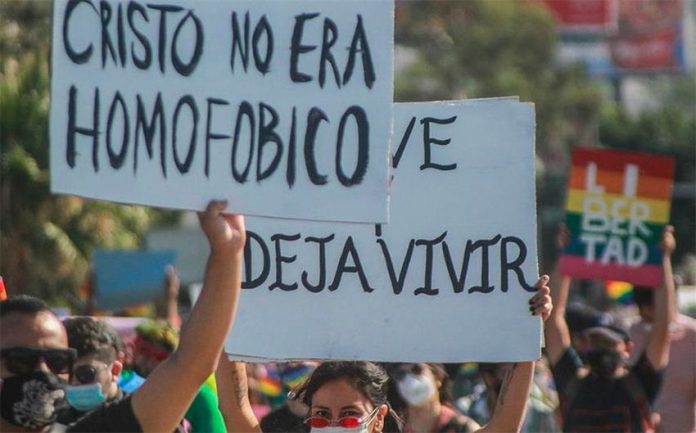So-called conversion therapies that target LGBTQ+ people in an attempt to change their sexual identity are illegal in Mexico City starting Friday.
Medical personnel who attempt to employ such therapy will face up to five years in prison.
The controversial practice often involves prayer and counseling, but at times also uses forms of torture to convince young gay people to adopt a heterosexual lifestyle. In the United States and parts of Europe, reconditioning techniques have used ice-pick lobotomies, chemical castration and nausea-inducing drugs to “convert” people from homosexuality.
The practice has been condemned by the American Medical Association, the American Psychological Association, and the United Nations (UN) and is banned in Brazil, Ecuador, Malta and Germany.
“The degrading nature of many conversion therapy practices, including physical abuse, electroshock therapy, pseudo-medical procedures, and the use of anti-LGBT epithets and slurs, contribute to an overall dehumanizing environment toward persons with diverse sexual orientation or gender identity,” said UN Independent Expert on Sexual Orientation and Gender Identity Victor Madrigal-Borloz.
Last Friday, Mexico City lawmakers approved a bill banning the practice, with enhanced sentencing if the victim is a minor. The new law criminalizes “practices consisting of psychological, psychiatric sessions, methods or treatments that are intended to nullify, hinder, modify or impair the expression of gender identity, as well as the sexual orientation of people.”
Efforts to “cure” homosexuality, which was once considered a mental illness, can be brutal and may have serious consequences. A 2019 study in the United States in which 35,000 LGBTQ+ young people were interviewed indicated that 42% of those who had experienced conversion therapy had attempted suicide.
“There is nothing to cure. Homosexuality is not a disease, we are not sick,” said Temístocles Villanueva, a Morena party legislator who authored the conversion therapy bill two years ago.
The new law is seen as a major victory for the LGBTQ+ community, both in Mexico and worldwide, in the battle to outlaw a practice that many view as akin to torture.
Longtime LGBTQ+ journalist and activist Enrique Torre Molina of Mexico City thanked the “brave activists and committed Mexico City legislators” for passing the law that protects the LGBTQ+ community in the nation’s capital city.
“Over the past few years I’ve come to know many — too many — stories of LGBTQ+ people who survived ‘conversion therapy’ and torture, or who have stepped away from their families who believed they could and should ‘change,’” Torre told the news platform Them. “It’s exciting to witness this historic win. Our community deserves love and respect.”
Mexico City Mayor Claudia Sheinbaum also applauded the decision. “I totally agree. It seems to me that these measures belong to the era of the Inquisition,” she said. “It does not correspond to the health systems of the 21st century, it does not correspond to the liberty of this city, because this is a city of rights.”
Source: Milenio (sp), Reuters (en), Scientific American (en), Them (en), Forbes (sp), El País (sp)
